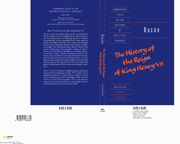Book contents
- Frontmatter
- Contents
- Editor's note
- Introduction
- Principal events in Bacon's life
- Select bibliography
- The History of the Reign of King Henry VII
- Fragmentary histories
- From the Essays (1625)
- Of Simulation and Dissimulation
- Of Seditions and Troubles
- Of Empire
- Of Counsel
- Of the True Greatness of Kingdoms and Estates
- Glossary
- Index
- Cambridge Texts in the History of Political Thought
Of the True Greatness of Kingdoms and Estates
Published online by Cambridge University Press: 05 June 2012
- Frontmatter
- Contents
- Editor's note
- Introduction
- Principal events in Bacon's life
- Select bibliography
- The History of the Reign of King Henry VII
- Fragmentary histories
- From the Essays (1625)
- Of Simulation and Dissimulation
- Of Seditions and Troubles
- Of Empire
- Of Counsel
- Of the True Greatness of Kingdoms and Estates
- Glossary
- Index
- Cambridge Texts in the History of Political Thought
Summary
The speech of Themistocles the Athenian, which was haughty and arrogant in taking so much to himself, had been a grave and wise observation and censure,* applied at large* to others. Desired at a feast to touch a lute, he said, ‘He could not fiddle, but yet he could make a small town a great city.’ These words (holpen* a little with a metaphor) may express two differing abilities in those that deal in business of estate.* For if a true survey be taken of counsellors and statesmen, there may be found (though rarely) those which can make a small state great, and yet cannot fiddle: as on the other side, there will be found a great many that can fiddle very cunningly, but yet are so far from being able to make a small state great, as their gift lieth the other way; to bring a great and flourishing estate to ruin and decay. And, certainly those degenerate arts and shifts, whereby many counsellors and governors gain both favour with their masters and estimation with the vulgar, deserve no better name than fiddling; being things rather pleasing for the time, and graceful to themselves only, than tending to the weal* and advancement of the state which they serve. There are also (no doubt) counsellors and governors which may be held sufficient* (negotiis pares), able to manage affairs, and to keep them from precipices and manifest inconveniences; which nevertheless are far from the ability to raise and amplify an estate in power, means, and fortune.
- Type
- Chapter
- Information
- Publisher: Cambridge University PressPrint publication year: 1998



